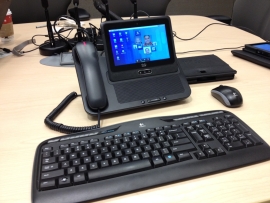Now you Cius, now you don't

Cisco has said it will stop making its Android-powered Cius tablet, putting the blame for the enterprise-specific device's death on the BYOD trend.

Cisco is no longer putting work into its business-centric Cius Android tablet. Photo credit: Roger Cheng/CNET News
But the move also adds Cisco to the list of 'grand plan, but poor execution' tablet makers, not least because it failed to respond to the rise of the iPad and other consumer devices in the workplace.
Cisco revealed it was bringing out the Cius tablet in June 2011, surprising people who were used to seeing it as a networking hardware and software company. At the time, it said its ambitions for the tablet were to be a leader in enterprise-grade mobility products.
Over following months, this ambition was scuppered by the popularity of the iPad within businesses and the numbers of people deciding to use the devices they already owned for work. BlackBerry suffered similarly with the poor adoption of its PlayBook tablet, which also aimed to tap into the enterprise clout of its parent company.
The impact of consumer devices was acknowledged by Cisco on Friday, when it confirmed plans to all but axe the Cius in favour of focusing on software.
"We are facing a workplace that is no longer a physical place, but a blend of virtual and physical environments; where employees are bringing their preferences to work and BYOD ('Bring Your Own Device' to work) is the new norm; where collaboration has to happen beyond a walled garden; and any-to-any connectivity is a requirement, not a 'nice to have'," OJ Winge, Cisco's head of collaboration endpoint technology, wrote in a blog post.
That's not a description of how Cius works. It's a tablet that comes with a hefty up-front cost, and relies on your company having thousands of pounds worth of Cisco systems already in use to get the most out of it — for example, it's designed to dock into a special phone. You can only buy it through Cisco's regular business channels, and not through retail outlets. On top of that, it's entirely aimed at business use, with enterprise voice, collaboration, virtualisation and security, with little in the way of after-hours, personal options.
That doesn't match up with what IT departments are being asked to provide by workers — and as such could be a poor business investment.
Fast moving business
Cisco's not the only tech giant to struggle to read the business market for mobile devices. HP also jumped in with a tablet, as the iPad sparked a host of 'me too' Android devices. It then killed the HP TouchPad under the leadership of Leo Apotheker, only to about-turn again under new chief executive Meg Whitman. HP now plans to put out a Windows 8-based tablet once the OS is released.
The difference between the two is that HP's decision centred on whether to persevere with its well-liked, but rarely purchased devices running its own webOS platform; and the changes were born out of a lack of leadership and direction at HP.
By contrast, Cisco had a stable executive team and the Cius was simply poorly envisioned for the future. The mobile market moves fast, and Cisco should have known this when it started planning. The BYOD trend did not arrive overnight, and the tablet only made it onto the market less than one year ago. Add to this that there will soon be several Windows 8 tablets on the market that will inherently be more enterprise-focused, and Cisco had an uphill battle on its hands.
Counting costs
HP and Cisco have one other thing in common in their tablets — they both got the price wrong.
In the UK, the Cius costs £800-plus for the 32GB version. An equivalent new iPad with data connectivity costs £579, and its popularity among workers means Apple's device is getting support from the IT help desk.
At that price — leaving aside the cost of the back-end systems that make the device worthwhile — the idea of 'picking up a Cius for surfing the web, doing work and the occasional movie' goes out of the window.
With its move, Cisco has accepted that there is no large market for the Cius and the planned second generation of the tablet, announced less than six months ago. The question now is who is the target buyer, given its price, its less-sleek chassis and the fact it uses Android Gingerbread rather than the most recent Ice Cream Sandwich.
"Cisco will no longer invest in the Cisco Cius tablet form factor, and no further enhancements will be made to the current Cius endpoint beyond what's available today," Winge said. "However, as we evaluate the market further, we will continue to offer Cius in a limited fashion to customers with specific needs or use cases."